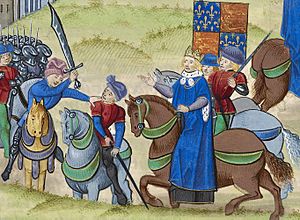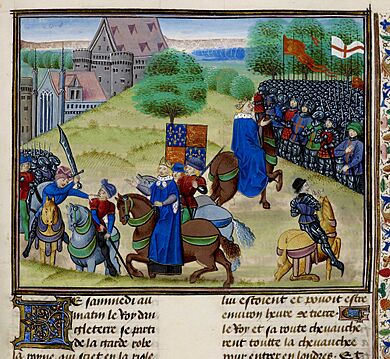John Cavendish facts for kids
Quick facts for kids
John Cavendish
|
|
|---|---|

The death of Wat Tyler (Cavendish far right, bearing decorated sword)
|
|
| Born | c. 1346 Cavendish, Suffolk, England |
| Died | 15 June 1381 |
| Nationality | English |
| Occupation | Judge, politician |
| Spouse(s) | Alice de Odingsells |
| Children | John Cavendish |
| Parent(s) | Robert de Gernon of Grimston Hall, Trimley St Martin, Suffolk |
| Relatives | Robert de Gernon (grandfather) Sir William Cavendish and George Cavendish (great-grandsons) |
Sir John Cavendish (born around 1346 – died June 15, 1381) was an important English judge and politician. He came from the village of Cavendish, Suffolk, in England. His family was so well-known that they gave their name, Cavendish, to powerful noble families. These families later became dukes and earls, like the Dukes of Devonshire.
Contents
Biography
Early Life and Family History
John Cavendish's family came from a Norman knight named Robert de Guernon. Robert lived a long time ago, during the rule of King Henry I. His family later settled in Suffolk, England.
A relative, Roger de Gernon, married a woman who owned land in the village of Cavendish. Because of this, Roger's four sons decided to change their family name. They took the name of the land they inherited: Cavendish. For many years, the family was known as Gernon alias Cavendish.
Career as a Judge
Sir John Cavendish married Alice de Odingsells. He became a lawyer and worked hard in the legal system. In 1371, he was made a Justice of the Common Pleas. This was an important job, like being a judge in a major court.
Just one year later, in 1372, he became the Chief Justice of the King's Bench. This was one of the highest legal positions in England. He had one son named Andrew. Andrew later inherited his father's estates, including the manor of Overhall.
Death During the Peasants' Revolt

On June 15, 1381, Sir John Cavendish was killed during a major event called the Peasants' Revolt. This was a large uprising by common people in England. They were unhappy with high taxes and other issues.
The revolt spread across the country. Sir John Cavendish was in Bury St Edmunds when the uprising reached there. Sadly, he lost his life during the conflict.
See also
 In Spanish: John Cavendish para niños
In Spanish: John Cavendish para niños
 | Roy Wilkins |
 | John Lewis |
 | Linda Carol Brown |

